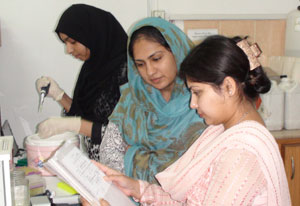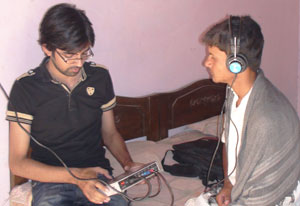Research in Pakistan yields findings on hereditary hearing loss
May / June 2014 | Volume 13, Issue 3

Photo courtesy of Dr. Sadaf Naz
Dr. Sadaf Naz (right) and her trainee Ayesha Imtiaz
(center) are studying hearing loss in Pakistan. They
both have trained at NIH, where Imtiaz is completing
her Ph.D. thesis research in Dr. Friedman's lab.
Dr. Sadaf Naz is investigating the world's largest cohort with hereditary moderate-to-severe hearing loss, which requires driving to remote Pakistani villages never before visited by a researcher and screening willing residents for auditory impairments. Naz, an associate professor at the University of the Punjab, has received NIH support as both a trainee and grantee, which led her to establish her institution's first human genetics laboratory.
"Most of my advanced training in molecular biology was at NIH," Naz said. "It allowed me to come back and establish an independent human genetics lab. I've been able to train students and build research capacity here in Lahore." Her current master's and doctoral trainees specialize in hearing, movement disorders and cleft palate; one has just completed a phase of training in deafness research training at the
National Institute on Deafness and Other Communication Disorders (NIDCD).
Naz found her way to the U.S. in large part by chance, she recalls. "In 1996, human molecular genetics was such a nascent field in Pakistan and there were very few opportunities," so she sent out a blanket of emails to global experts in hearing loss genetics - her field of research during her Ph.D. degree. The NIDCD invited her to the U.S. to train and later offered her a postdoctoral fellowship.
Back at home, she secured funding from the Pakistani government and then was the first scientist in Pakistan to obtain an R01 research grant from the NIH - a Fogarty Global Research Initiative Program award. This enabled her to hunt for genetic mutations involved in moderate-to-severe hearing loss. "It's harder to find people with this condition," Naz said. "In profound deafness, people use sign language and attend special schools, so are easier to identify. For our research, we have to do a lot of audiograms [hearing tests] and fieldwork to find families with a high prevalence."

Photo by Ayesha Imtiaz
Dr. Naz's team conducts hearing tests in various
remote locations.
From their efforts thus far, Naz and her team have studied more than 80 large families and identified mutations in three new genes which cause progressive or stable hearing loss, findings that extend the world's knowledge about the inheritability of moderate-to-severe symptoms and increase the hope of eventual interventions.
"I'd like human genetics to come into its own in Pakistan. We have a lot of genetic defects, the reason being marriages between cousins or other close relatives," she said, noting that the health care system does not automatically conduct newborn screening as happens in the U.S. "We now have mapping, identification of human genes, but no genetic counselors, no center where people can get information or testing. If I could establish such a facility, I would be very happy."
More Information
To view Adobe PDF files,
download current, free accessible plug-ins from Adobe's website.